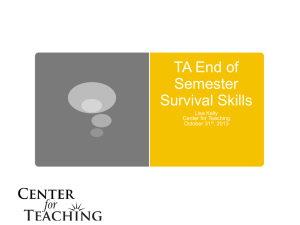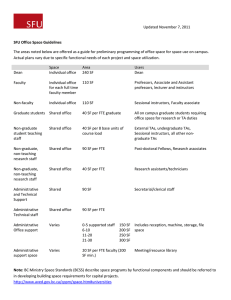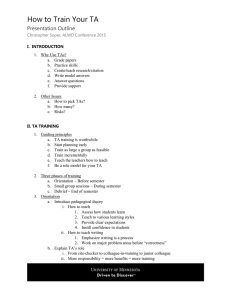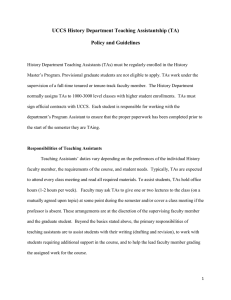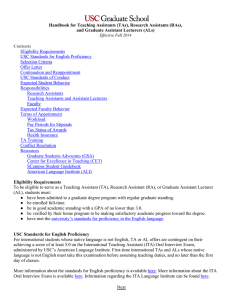Proposal to move CGS2100/CGS2060 to a Distance Learning Format
advertisement
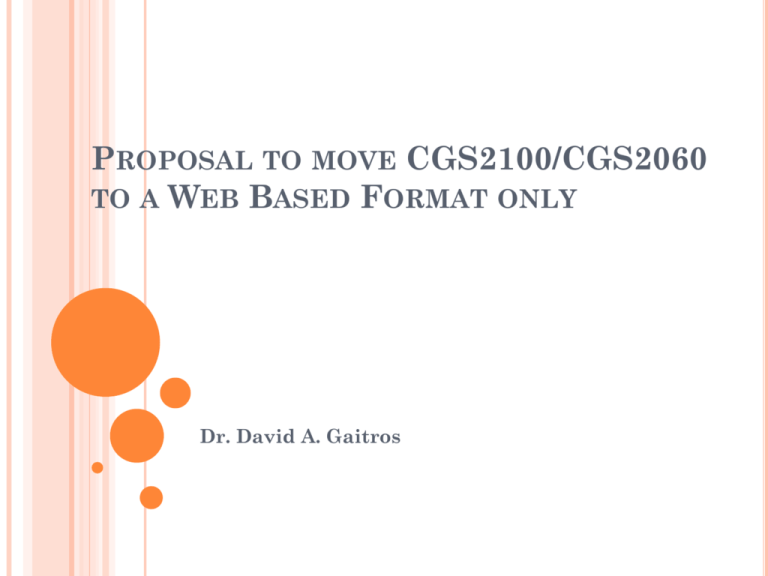
PROPOSAL TO MOVE CGS2100/CGS2060 TO A WEB BASED FORMAT ONLY Dr. David A. Gaitros THE PROBLEM Interest in Computer Science is growing More diverse degree programs Large enrollment in both introductory and advanced classes Growing interest in area specific courses mobile program gaming security/cryptography etc. Increase demand for our faculty With a shrinking budget and faculty: Bottom Line: We must use the faculty more affectively. Problems with current Computer Literacy Large lecture halls at reasonable times are highly sought after commodities Lectures are time consuming and not necessary Very low attendance in lecture Low Student Evaluations for faculty Class perceived as “trivial” by students Attempts to use the discussion boards failed Having both web based classroom based sections complicate the semester’s activity Not enough classrooms or faculty to get rid of Web Based classes Must have Separate Blackboard sites for both Essentially the same course Too much material for in-class students Not enough material for web-based students Web based students don’t do the readings Problems with Computer Literacy (cont.) Cannot give up Computer literacy because Reduction in number of students would drastically reduce overall FTE statistics. Loss of funding from the College (OPS) Perhaps even the loss of a faculty member Could result in an increase teaching load for ALL faculty Loss of 24+ Graduate Students Giving up CGS2100 and CGS2060 would give PIC and Scientific Computing a reason to exist, funding and more graduate students SOLUTION Migrate CGS2100/CGS2060 to Web Based Format only No Lectures/ No Classes scheduled Most day-to-day semester activities handled by Graduate Assistants/Mentors Open to all on-Campus students Wider student population More flexible schedule Athletic Department and College of Business has requested this Potential for increasing our FTE without increasing workload HOW? Three things are missing to make this a completely Web-Based course: Weekly quizzes that complete cover the reading material (forces students to study) Most books have a question bank/answers for reading material A weekly study guide that directs the students on their required activities Better quality Video Tutorials that cover the skills assignments. ORGANIZATION Divide Course organization and administration among faculty (mostly non-tenured) Divide the 1.0 FTE among the faculty Prevents administration from increasing teaching loads Allows us to use our faculty more efficiently and effectively. Use more experienced graduate assistants to: Manage the Help Desk Manage and monitor Graders Manage Testing and Test Reservation System Answer student questions Monitor discussion boards CGS2100/CGS2060 SAMPLE FACULTY ACTIVITIES AND DIVISION OF RESPONSIBILITIES (50%) Course Coordinators Course Syllabus, Agenda, Study Guide Syllabus Quiz Blackboard Sites creation and maintenance 1st Day Attendance, Drop/Add, Announcements TA Administration and Assignments Final Grades (25%) Course Study Materials Test Center coordination (All Test Centers) Test Reservation System Weekly Quizzes Tests (25%) Assignment Preparation Assignments (both 2100/2060) Assignment Examples for TAs Grading Rubric Video Tutorials CGS2100/CGS2060 TA ACTIVIES Set up Test Reservation System Answer questions on Test Reservations Communicate with Testing Center Add/update/delete users Help Desk Organization Assignment TAs to Help Desk Monitor sessions and manage schedule Grading Supervision Assign Grading Ranges Monitor Progress/Quality Control Set up and manage Discussion boards Post Issues/Answer questions (All help desk Individuals) BENEFITS Most faculty activities involved with the course are preparatory and occur before semester. Once accomplished, material need only be updated each semester Less work for 25% - 33% which is usually considered a full 3 hour course. Increase or decrease in student population does not affect faculty workload…just the number of TAs needed. DISCUSSION

